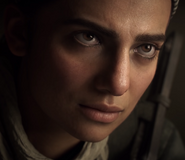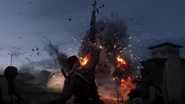
Template:Infobox/soldier
Commander Farah Amhed Karim[1] is a character in the upcoming Call of Duty: Modern Warfare.
Biography
When Farah was 7-10 years old, Russian forces were present in Urzikstan. Her mother was crushed by rubble from a Russian artillery strike, and she then watched her father be murdered by a Russian soldier. Farah and her brother, Hadir, then promptly killed the soldier in question. Donning a gas mask, Farah snuck out of her home, evading Russian troopers. She ended up becoming a freedom fighter.[2]
Years later, Farah would go on to become the leader of the Urzikstan Liberation Force, a group of over 7,000 volunteer freedom fighters determined to free their country from foreign subjugation. To accomplish their goals, the ULF would often fight alongside and receive support from both the US Central Intelligence Agency and the British Special Air Service; the latter of which would establish a working relationship with Captain John Price.
Farah Amhed Karim is the founding member and commander of the Urzikstan Liberation Force, battling foreign occupation since 2010. She is renowned not only for leading the resistance against enemy troops, but for establishing protective units to combat terror groups throughout Urzikstan. Under Farah's leadership, civilian militias play a critical role in the fight to return their subjugated population to sovereignty. Her forces comprise male and female volunteer fighters with maximum age limit. Farah does not allow those under the age of 15 to take part in frontline fighting, but anyone and everyone is invited to undergo military training and join her reserves.
To protect her people from owing a debt to the world, Farah accepts only select funding and equipment from the international community, preferring to keep her forces reliant on their own for material support. Raising her army with little more than commandeered weapons and unofficial support from the SAS's legendary Bravo Squadron, Farah says “Will is the most powerful weapon.” As a girl, in the opening salvos of the invasion, she and her brother Hadir were caught, spending their teens held as POWs by General Barkov's rogue forces where captives were subjected to forced labor, routinely witnessing acts of chemical experimentation on fellow prisoners.
In 2009, Farah led an escape, fighting alongside a western aide unit. She vowed then to give her life to freeing her country from subjugation and chaos. When asked if women can be as effective as men in combat, Farah describes the question as sexist and objectifying. Farah wants to give women their rightful place, not only in combat, but in a society free from war. For Farah, war is more than the liberation of land. “We are also fighting to free our people from old-fashioned ways.”
Impressed by seeing females in combat and leadership roles, wives, mothers, and daughters fight without pay, food or medicine, to follow Farah into battle, Farah Karim's modern beliefs have had far-reaching effects, and occupying soldiers often directly hunt and target her. Labeled a terrorist organization by the Russian government for their long-standing resistance, Russian soldiers are ordered to make no distinction between the terror group Al-Qatala and the liberation fighters under Farah's command. AQ terrorists pursue Farah and the ULF with a mandate to kill.
Farah's worldview draws a sharp line of demarcation between herself and the enemy. “The enemy has come where they are not welcomed and taken what is not theirs.” Farah refuses to stage counter-offensives or launch attacks beyond the borders of her country, believing with all her heart that what distinguishes her from the terrorists and the occupiers is never crossing the line from defender to aggressor. “We are a protective force, we are rescuers, not killers.”[3]
Gallery
References
- ↑ https://blog.activision.com/call-of-duty/2019-09/The-Narrative-of-Modern-Warfare-Part-3
- ↑ https://www.kotaku.com.au/2019/06/call-of-duty-modern-warfares-developers-are-still-deciding-how-disturbing-to-get/
- ↑ https://blog.activision.com/call-of-duty/2019-10/Modern-Warfare-Campaign-Biographies-of-the-Storys-Major-Players-Part-3




